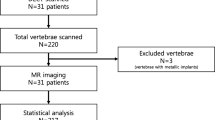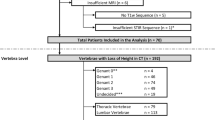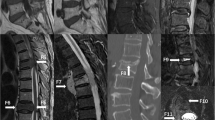Abstract
Introduction
Goals were to compare the performance of lateral radiographs and sagittal reformations (SR) of axial computed tomography (CT) datasets in identification of osteoporotic vertebral fractures and to assess for optimal slice thickness in axial CT datasets needed for reliable classification of these fractures.
Methods
Sixty-five vertebrae were harvested from 21 human cadaver spines and examined with a 64-row multidetector CT scanner. Axial images were acquired with a slice thickness of 0.6, 1, 2, 3 and 5 mm and SR were obtained using these datasets. In addition, specimens were radiographed in antero-posterior and lateral orientation. Vertebrae visualized in the different image datasets were separately graded by four radiologists according to the spinal fracture index (SFI) classification. Fracture status determined in a consensus reading of interactive reformations of the 0.6-mm CT dataset in all three dimensions served as a standard of reference in combination with pathological examinations.
Results
The average agreement for the 0.6-mm SR obtained between each radiologist and standard of reference for the grading of the fractures was very good (κ=0.81). It was good for the 1-, 2- and 3-mm SR (κ=0.70, 0.69 and 0.64), but only moderate for the radiographs (κ=0.52), and fair for the 5-mm SR (κ=0.33). When focusing only on detection of fractures, independent of the grading, all κ values improved by about 0.15, resulting in excellent values for the 0.6-mm through 3-mm SR (0.95<κ<0.79) and good values for the radiographs (κ=0.72). Ninety-five percent of the fractures could be identified using the 1-mm SR, but 18% of the fractures were missed on the radiographs.
Conclusions
Sagittal CT reformations could more accurately assess vertebral fractures than standard radiographs. But for reliable detection of these fractures, SR derived from axial images with a slice thickness of 3 mm or less are required. The thinnest available axial slice thickness performed best in fracture grading.






Similar content being viewed by others
References
Center JR, Nguyen TV, Schneider D, Sambrook NP, Eisman JA (1999) Mortality after all major types of osteoporotic fracture in men and women: an observational study. Lancet 353:878–882
O’Neill TW, Cockerill W, Matthis C, Raspe HH, Lunt M, Cooper C, Banzer D, Cannata JB, Naves M, Felsch B, Felsenberg D, Janott J, Johnell O, Kanis JA, Kragl G, Lopes Vaz A, Lyritis G, Masaryk P, Poor G, Reid DM, Reisinger W, Scheidt-Nave C, Stepan JJ, Todd CJ, Woolf AD, Reeve J, Silman AJ (2004) Back pain, disability, and radiographic vertebral fracture in European women: a prospective study. Osteoporos Int 15:760–765
Cockerill W, Lunt M, Silman AJ, Cooper C, Lips P, Bhalla AK, Cannata JB, Eastell R, Felsenberg D, Gennari C, Johnell O, Kanis JA, Kiss C, Masaryk P, Naves M, Poor G, Raspe H, Reid DM, Reeve J, Stepan J, Todd C, Woolf AD, O’Neill TW (2004) Health-related quality of life and radiographic vertebral fracture. Osteoporos Int 15:113–119
Doherty DA, Sanders KM, Kotowicz MA, Prince RL (2001) Lifetime and five-year age-specific risks of first and subsequent osteoporotic fractures in postmenopausal women. Osteoporos Int 12:16–23
Link TM, Guglielmi G, Kuijk van C, Adams J (2005) Radiologic assessment of osteoporotic vertebral fractures: diagnostic and prognostic implications. Eur Radiol 15:1521–1532
Ensrud K, Thompson D, Cauley J, Nevitt M, Kado D, Hochberg M, Santora A2, Black D (2000) Prevalent vertebral deformities predict mortality and hospitalization in older women with low bone mass. Fracture Intervention Trial Research Group. J Am Geriatr Soc 48:241–249
Gehlbach S, Bigelow C, Heimisdottir M, May S, Walker M, Kirkwood J (2000) Recognition of vertebral fracture in a clinical setting. Osteoporos Int 11:577–582
Kim N, Rowe BH, Raymond G, Jen H, Colman I, Jackson SA, Siminoski KG, Chahal AM, Folk D, Majumdar SR (2004) Underreporting of vertebral fractures on routine chest radiography. AJR Am J Roentgenol 182:297–300
Mueller D, Isbary M, Boehm H, Bauer JS, Rummeny EJ, Link TM (2004) Recognition of osteoporosis-related vertebral fractures on chest radiographs in postmenopausal women. Radiology 233:305
Mui LW, Haramati LB, Alterman DD, Haramati N, Zelefsky MN, Hamerman D (2003) Evaluation of vertebral fractures on lateral chest radiographs of inner-city postmenopausal women. 73:550–554
Delmas PD, van de LL, Watts NB, Eastell R, Genant H, Grauer A, Cahall DL (2005) Underdiagnosis of vertebral fractures is a worldwide problem: the IMPACT study. J Bone Miner Res 20:557–563
Mueller D, Zeile M, Bauer JS, Rummeny EJ, Link TM (2005) Vertebral fractures and other spine pathologies only detected with sagittal reformations of routine thoracic and abdominal multisclice CT images. Submitted to RSNA
Ohnesorge B, Flohr T, Schaller S, Klingenbeck-Regn K, Becker C, Schopf UJ, Bruning R, Reiser MF (1999) [The technical bases and uses of multi-slice CT]. Radiologe 39:923–931
Brandt MM, Wahl WL, Yeom K, Kazerooni E, Wang SC (2004) Computed tomographic scanning reduces cost and time of complete spine evaluation. J Trauma 56:1022–1026
Rubin GD (2000) Data explosion: the challenge of multidetector-row CT. Eur J Radiol 36:74–80
Genant HK, Wu CY, van Kuijk C, Nevitt MC (1993) Vertebral fracture assessment using a semiquantitative technique. J Bone Miner Res 8:1137–1148
Cohen J (1960) A coefficient of agreement for nominal scales. Educ Psychol Meas 20:37–46
Altman D (1991) Practical statistics for medical research. Chapman and Hall, London
Hanley JA, McNeil BJ (1982) The meaning and use of the area under a receiver operating characteristic (ROC) curve. Radiology 143:29–36
Begemann PG, Kemper J, Gatzka C, Stork A, Nolte-Ernsting C, Adam G (2004) Value of multiplanar reformations (MPR) in multidetector CT (MDCT) of acute vertebral fractures: do we still have to read the transverse images? J Comput Assist Tomogr 28:572–580
Gestring ML, Gracias VH, Feliciano MA, Reilly PM, Shapiro MB, Johnson JW, Klein W, Kauder DR, Schwab CW (2002) Evaluation of the lower spine after blunt trauma using abdominal computed tomographic scanning supplemented with lateral scanograms. J Trauma 53:9–14
Wintermark M, Mouhsine E, Theumann N, Mordasini P, van Melle G, Leyvraz PF, Schnyder P (2003) Thoracolumbar spine fractures in patients who have sustained severe trauma: depiction with multi-detector row CT. Radiology 227:681–689
Link TM, Meier N, Rummeny EJ, Garman S, Steinbeck J, Schröder M, Oelerich M, Häussler MD (1996) Detection of artificial spine fractures using helical and conventional CT. Radiology 198:515–519
Blackmore CC, Mann FA, Wilson AJ (2000) Helical CT in the primary trauma evaluation of the cervical spine: an evidence-based approach. Skeletal Radiol 29:632–639
Daffner RH, Daffner SD (2002) Vertebral injuries: detection and implications. Eur J Radiol 42:100–116
Eastell R, Cedel SL, Wahner HW, Riggs BL, Melton LJ, III (1991) Classification of vertebral fractures. J Bone Miner Res 6:207–215
Leidig-Bruckner G, Genant HK, Minne HW, Storm T, Thamsborg G, Bruckner T, Sauer P, Schilling T, Soerensen OH, Ziegler R (1994) Comparison of a semiquantitative and a quantitative method for assessing vertebral fractures in osteoporosis. Bone 15:437–442
Barnett E, Nordin B (1960) The radiological diagnosis of osteoporosis: a new approach. Clin Radiol 11:166–174
McCloskey EV, Spector TD, Eyres KS, Fern ED, O'Rourke N, Vasikaran S, Kanis JA (1993) The assessment of vertebral deformity: a method for use in population studies and clinical trials. J Bone Miner Res 8:1137–1148
Wu C, van Kuijk C, Li J, Jiang Y, Chan M, Countryman P, Genant HK (2000) Comparison of digitized images with original radiography for semiquantitative assessment of osteoporotic fractures. Osteoporos Int 11:25–30
Ettinger B, Block JE, Smith R, Cummings SR, Harris ST, Genant HK (1988) An examination of the association between vertebral deformities, physical disabilities and psychosocial problems. Maturitas 10:283–296
Storm T, Thamsborg G, Steiniche T, Genant HK, Sorensen OH (1990) Effect of intermittent cyclical etidronate therapy on bone mass and fracture rate in women with postmenopausal osteoporosis. N Engl J Med 322:1265–1271
Black DM, Palermo L, Nevitt MC, Genant HK, Christensen L, Cummings SR (1999) Defining incident vertebral deformity: a prospective comparison of several approaches. The Study of Osteoporotic Fractures Research Group. J Bone Miner Res 14:90–101
Lunt M, O’Neill TW, Felsenberg D, Reeve J, Kanis JA, Cooper C, Silman AJ (2003) Characteristics of a prevalent vertebral deformity predict subsequent vertebral fracture: results from the European Prospective Osteoporosis Study (EPOS). Bone 33:505–513
UNESCEAR (United Nations Scientific Committee on the Effects of Atomic Radiation) (2000) Sources and effects of ionising radiation. Vol 1: Sources, Annex D, Medical radiation exposures. United Nations, New York
Hart D, Wall BF (2004) UK population dose from medical X-ray examinations. Eur J Radiol 50:285–291
Ismail AA, Cockerill W, Cooper C, Finn JD, Abendroth K, Parisi G, Banzer D, Benevolenskaya LI, Bhalla AK, Armas JB, Cannata JB, Delmas PD, Dequeker J, Dilsen G, Eastell R, Ershova O, Falch JA, Felsch B, Havelka S, Hoszowski K, Jajic I, Kragl U, Johnell O, Lopez Vaz A, Lorenc R, Lyritis G, Marchand F, Masaryk P, Matthis C, Miazgowski T, Pols HA, Poor G, Rapado A, Raspe HH, Reid DM, Reisinger W, Janott J, Scheidt-Nave C, Stepan J, Todd C, Weber K, Woolf AD, Ambrecht G, Gowin W, Felsenberg D, Lunt M, Kanis JA, Reeve J, Silman AJ, O’Neill TW (2001) Prevalent vertebral deformity predicts incident hip though not distal forearm fracture: results from the European Prospective Osteoporosis Study. Osteoporos Int 12:85–90
Kado DM, Duong T, Stone KL, Ensrud KE, Nevitt MC, Greendale GA, Cummings SR (2003) Incident vertebral fractures and mortality in older women: a prospective study. Osteoporos Int 14:589–594
Melton LJ, III, Atkinson EJ, Khosla S, Oberg AL, Riggs BL (2005) Evaluation of a prediction model for long-term fracture risk. J Bone Miner Res 20:551–556
Takada M, Wu CY, Lang TF, Genant HK (1998) Vertebral fracture assessment using the lateral scoutview of computed tomography in comparison with radiographs. Osteoporos Int 8:197–203
Acknowledgement
This work was supported by a grant of the Deutsche Forschungsgemeinschaft (DFG LO 730/3–2).
Author information
Authors and Affiliations
Corresponding author
Rights and permissions
About this article
Cite this article
Bauer, J.S., Müller, D., Ambekar, A. et al. Detection of osteoporotic vertebral fractures using multidetector CT. Osteoporos Int 17, 608–615 (2006). https://doi.org/10.1007/s00198-005-0023-8
Received:
Accepted:
Published:
Issue Date:
DOI: https://doi.org/10.1007/s00198-005-0023-8




